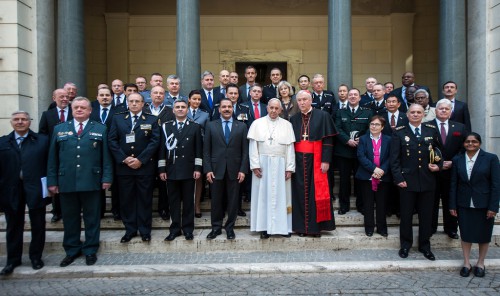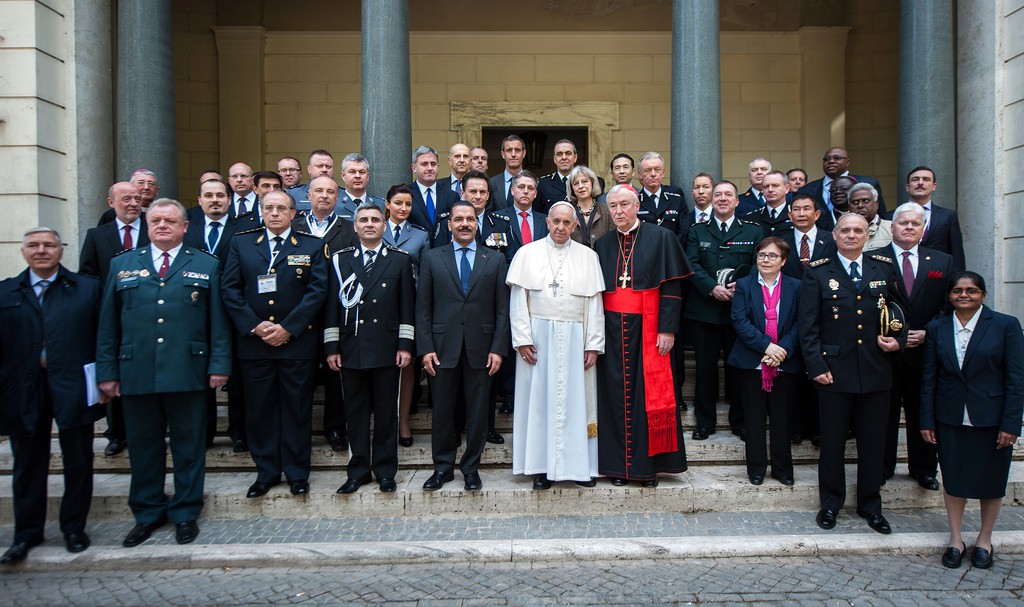
Photo: © Mazur/catholicnews.org.uk
“An open wound on the body of contemporary society, a scourge on upon the body of Christ. It is a crime against humanity”. With these words, Pope Francis addressed the second international conference in the Vatican organised by the Catholic Bishops Conference of England and Wales and the Metropolitan Police on “Combating Human Trafficking: Church and Law Enforcement in partnership”, which took place earlier this week.
Significantly, the meeting was held in the Pontifical Academy of Sciences, one of the hubs of Holy See work on human trafficking, the home of the new Global Freedom Network, and the place where Pope Francis’s own call to action on human trafficking has resonated most loudly since the start of his Pontificate. Pope Francis wanted to give his blessing to the conference and, unusually, came to the Pontifical Academy himself to do so.
Why has Pope Francis taken this lead? He has placed human dignity at the heart of his ministry, and has identified modern slavery as the greatest affront to human dignity in the 21st century. More people are trafficked as slaves in 2014 than at the height of the slave trade in the 18th century. And yet, as we learned at the conference, only 1% of victims are ever identified and saved. Traffickers – modern slavers – see it as a low risk, high profit crime. And they have no compunction in trading in human misery to make their gains, as the conference heard, in heartbreaking terms, from three brave victims, since rescued, trafficked into the UK from Chile, Czech Republic and Hungary.
Police chiefs from around the world – including Ghana, Romania, the UK, Poland, Argentina, the US, and the Philippines – left the event with much to consider. Importantly, they signed a global commitment “to eradicate the scourge of this serious criminal activity”, agreeing at the same time to “placing the victim at the centre of all that we do”. In her address to conference participants, the British Home Secretary, Theresa May, recalled Pope Francis’s words, pledging to “fight this abhorrent crime, support victims and raise awareness”.
The Home Secretary also announced, alongside the Metropolitan Police Commissioner, the creation of the “Santa Marta Group” of international police chiefs to take forward practical work, working alongside civil society and faith networks. Their next meeting will be in London in November, to be focused on specific and operational measures that need to be taken. Their meeting is also likely to inform Britain’s new Modern Slavery bill, which will be introduced into parliament in June and should, with cross-party support, become law before the middle of next year.
Pope Francis called his attendance at the conference “a gesture towards people of good will who want to say, ‘enough!’”. Cardinal Nichols, Archbishop of Westminster, led those who praised the Pope for placing modern slavery at the top of the modern political agenda. So much needs to be done. This is an immense criminal business that crosses borders, and we can only succeed by working through partnership, across nations and institutions.
My congratulations to the Metropolitan Police and the Catholic Bishops Conference of England and Wales for making this conference happen. By bringing together police, government, civil society and faith, it was an important example of the way forward.

